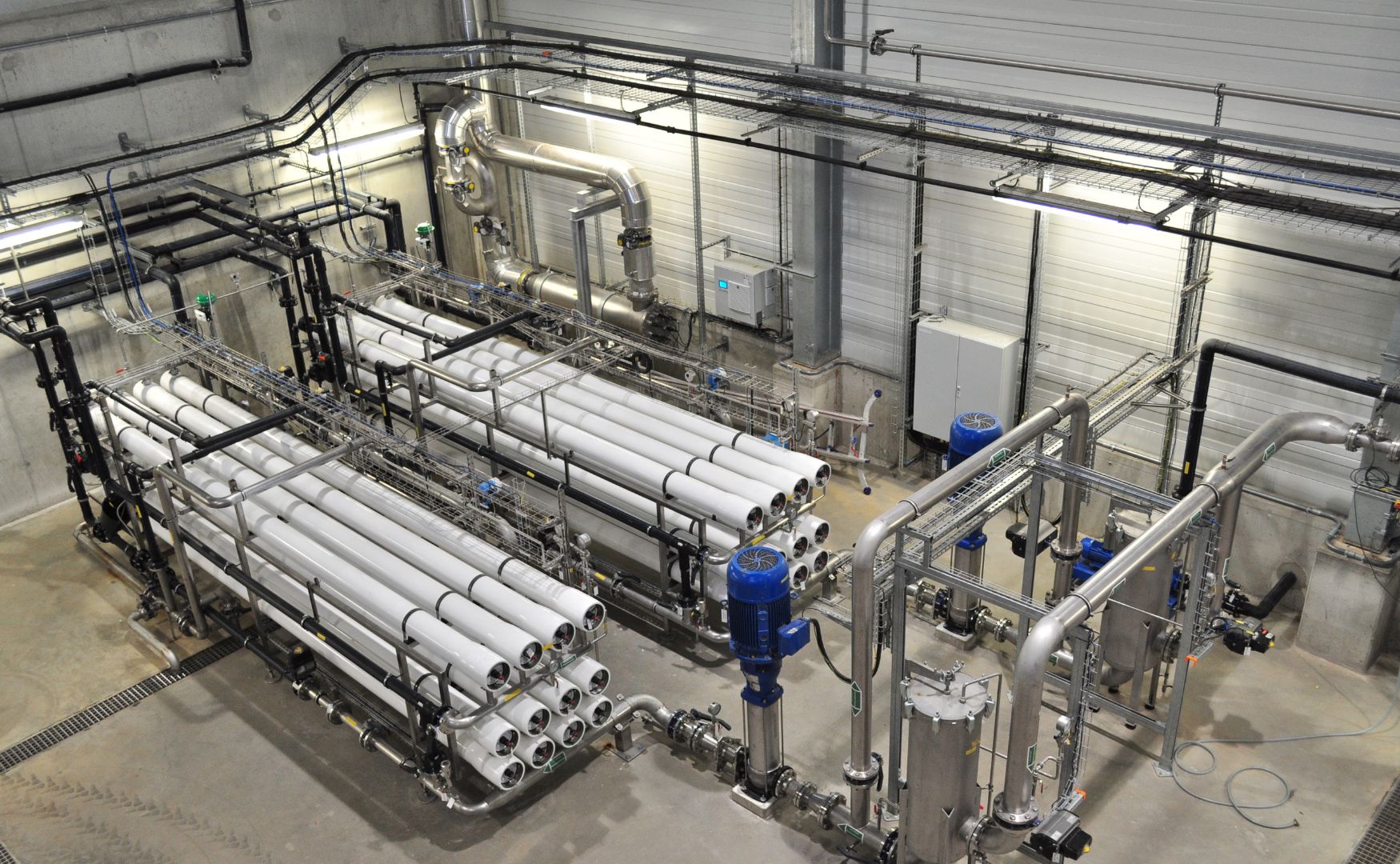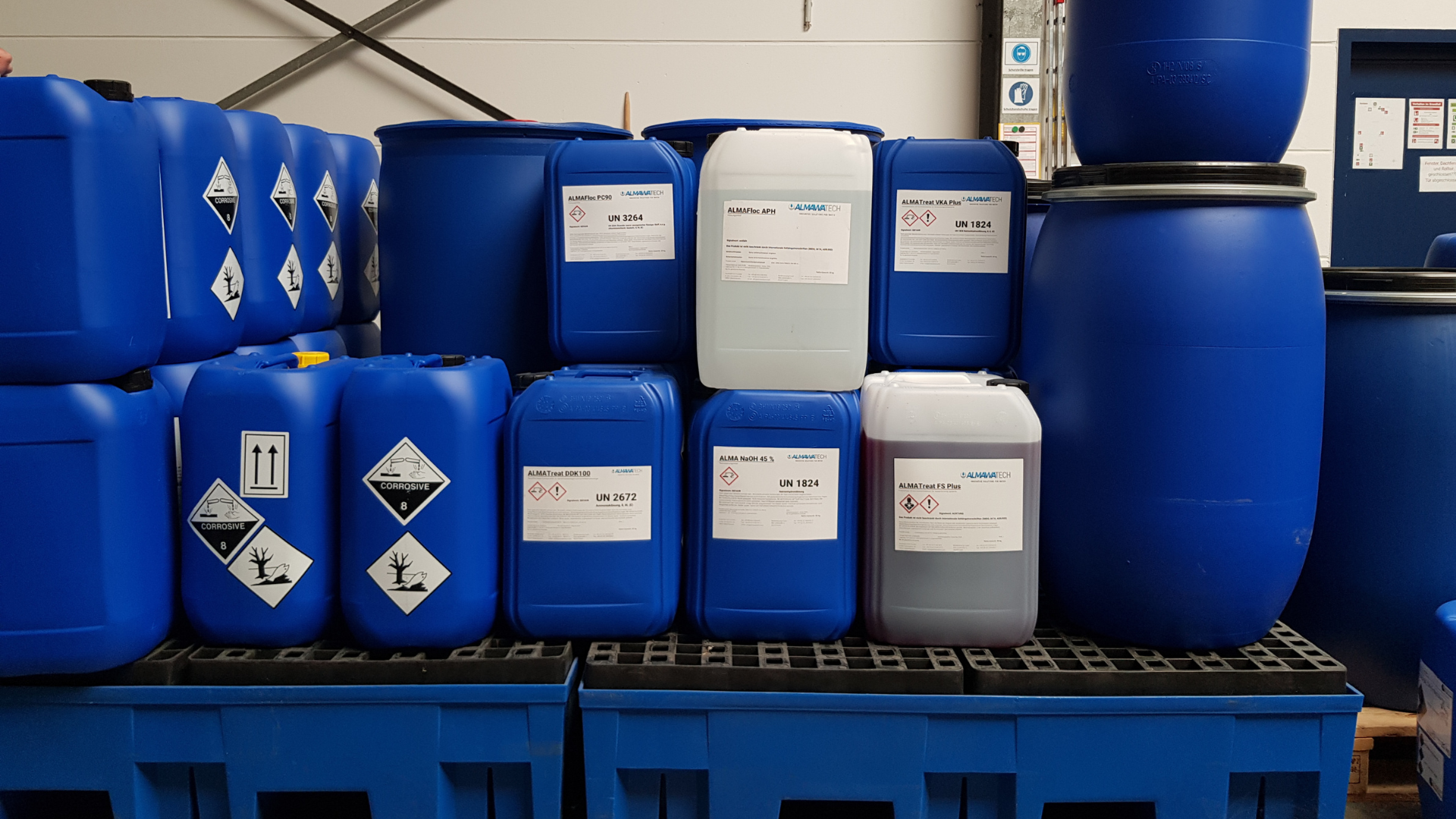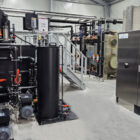Scaling ( Scaling refers to the formation of solid, crystalline deposits on surfaces that are in contact with water. These deposits are caused by the supersaturation of certain dissolved salts in the water, which precipitate under specific thermodynamic conditions. Scaling is a common problem in industrial systems such as heat exchangers, piping, cooling towers, boilers and membrane systems and can significantly affect the efficiency and service life of these systems.
Table of contents
Causes of scaling
The main cause of scaling is the supersaturation of salts in the water, which leads to their crystallization. The following factors contribute to the formation of scaling:
Chemical composition of the water
- Hardener:
- Calcium and magnesium ions are the main causes of scaling.
- Examples: Calcium carbonate (CaCO₃), calcium sulphate (CaSO₄).
- Other scaling-causing substances:
- Silicates: formation of silicic acid deposits (SiO₂).
- Barium and strontium compounds: Barium sulphate (BaSO₄) and strontium sulphate (SrSO₄).
Temperature
- As the temperature rises, the solubility of many salts (e.g. calcium carbonate) decreases. This leads to the precipitation of salts in heat-intensive processes such as in boilers or heat exchangers.
pH value
- An increase in the pH value increases the formation of calcium carbonate, as more carbonate ions are available.
Pressure
- In high-pressure systems, such as reverse osmosis systems, the increased concentration of salts due to pressure can lead to supersaturation and thus to scaling.
Evaporation
- In cooling towers and closed circuits, evaporation increases the salt content in the water, which promotes supersaturation.
Effects of scaling
Scaling has a serious impact on the operation and efficiency of systems:
Heat transfer
- Deposits in heat exchangers and boilers act as insulators, which impairs heat transfer and increases energy consumption.
Hydraulics
- Scaling reduces the cross-section of pipes and ducts, which increases the pressure loss and reduces the flow capacity.
Damage to systems
- Hard deposits can promote corrosion by creating localized concentration cells.
- Scaling can clog and irreversibly damage membranes in reverse osmosis systems.
Maintenance effort and costs
- Regular cleaning and descaling lead to increased operating costs and longer downtimes.
Detection and monitoring of scaling
Visual inspection:
- Detection of deposits in pipes or heat exchangers by visual inspection.
Analysis of the water chemistry:
- Determination of hardness (calcium and magnesium concentration) and other scaling-relevant ions (e.g. sulphates, silicates).
- Measurement of the pH value and alkalinity.
Indices for scaling evaluation:
- Langelier saturation index (LSI):
- Indicates whether water tends to form scaling.
- Positive values indicate a scaling tendency.
- Ryznar Stability Index (RSI):
- Evaluates the stability of calcium carbonate in water.
- Langelier saturation index (LSI):
Online monitoring:
- Use of conductivity, turbidity meters or ion sensors for real-time monitoring.
Prevention and control of scaling
1. water treatment
Softening
One of the most basic measures to prevent scaling is the removal of hardness formers (calcium and magnesium ions) from the water.
Ion exchange process:
- Hardness formers are removed by ion exchange resins and exchanged for sodium ions.
- Advantage: Effective reduction of calcium and magnesium ions that cause scaling.
- Area of application: Cooling water systems, boiler systems and process water circuits.
Soda-lime process:
- Addition of milk of lime (Ca(OH)₂) and sodium bicarbonate (NaHCO₃) to precipitate calcium and magnesium carbonates.
- Advantage: Particularly suitable for large volumes of water, such as those found in river water treatment.
Membrane process
Membrane processes such as nanofiltration (NF) and reverse osmosis (RO) are highly efficient technologies for removing scaling-causing salts.
Nanofiltration (NF):
- Removal of divalent ions such as calcium and magnesium, which are the main causes of scaling.
- Typical application: Pre-treatment of process water for cooling or boiler circuits.
- Removes almost all dissolved salts, including poorly soluble compounds such as calcium sulphate (CaSO₄).
- Challenge: Membranes are particularly susceptible to scaling and require the use of antiscalants such as ALMA AQUA Mem.

Photo: Our ALMA OSMO reverse osmosis system for in-house water recycling
2. chemical processes for scaling prevention
Antiscalants for membrane processes
Antiscalants prevent the crystallization of salts and their deposition on membrane surfaces. ALMAWATECH offers specially developed products for the optimization of membrane systems:
- ALMA AQUA Mem Antiscalants:
- Highly effective phosphonates and polyacrylates that inhibit the formation of calcium carbonate, calcium sulphate, barium sulphate and silicates.
- Advantages:
- Extended service life of membranes.
- Higher efficiency of the reverse osmosis system by reducing scaling.
- Optimization of the retention rate at high concentrations of scaling-causing ions.
Hardness stabilizers and dispersants for cooling and boiler circuits
Cooling water systems and boiler systems are particularly susceptible to scaling due to high temperatures and evaporation, which increase the concentration of salts. ALMAWATECH offers effective solutions with ALMA AQUA hardness stabilizers and dispersants:
- Specially formulated phosphonates and polyacrylates that increase the solubility of hardening agents and prevent their precipitation.
- Areas of application:
- Open and closed cooling water systems.
- Boiler systems with medium to high pressure.
- Advantages:
- Prevention of calcium carbonate and calcium sulphate deposits.
- Protection of heat exchangers and pipelines against scaling.
- Dispersants keep fine particles in suspension and prevent them from settling.
- Effective in controlling more complex scaling compounds such as silicates and iron oxides.
- Areas of application:
- Industrial cooling circuits with high loads due to suspended solids.
- Advantages:
- Protection against fouling-related heat loss.
- Reduction in cleaning and maintenance work.
3. operational optimization
- Temperature management:
- Limiting the operating temperature in heat exchangers and boilers.
- Blasdown (desalination):
- In cooling towers, concentrated water is drained and replaced with fresh water to control the salt concentration.
4. mechanical cleaning
- Regular cleaning of pipes and heat exchangers by chemical or mechanical descaling.

Photo: ALMA AQUA operating fluids, antiscalants for membrane systems, hardness stabilizers for cooling circuits and boiler systems
Scaling in specific application areas
1. cooling circuits
- Problem: Evaporation leads to the accumulation of hardeners and silicates.
- Solution: Use of antiscalants and blowdown process.
2. boiler systems
- Problem: Formation of hard limestone deposits due to high temperatures and pressures.
- Solution: Boiler water treatment with softening and desalination.
3. reverse osmosis systems
- Problem: Scaling of calcium sulphate and silicates on the membranes.
- Solution: Addition of antiscalants and regular dry cleaning.
4. river water treatment
- Problem: High concentrations of suspended and dissolved salts.
- Solution: Pre-filtration and softening before water treatment.
Conclusion
Scaling is a widespread problem in industrial water and wastewater treatment that can significantly affect the efficiency and service life of systems. A comprehensive analysis of water chemistry, the use of modern water treatment technologies and preventive measures such as the use of antiscalants and hardness stabilizers are crucial to avoid scaling. Continuous monitoring and optimization of operating conditions helps to minimize maintenance and energy consumption costs and ensure operational safety.
For further information on our products, please feel free to contact us at any time!








